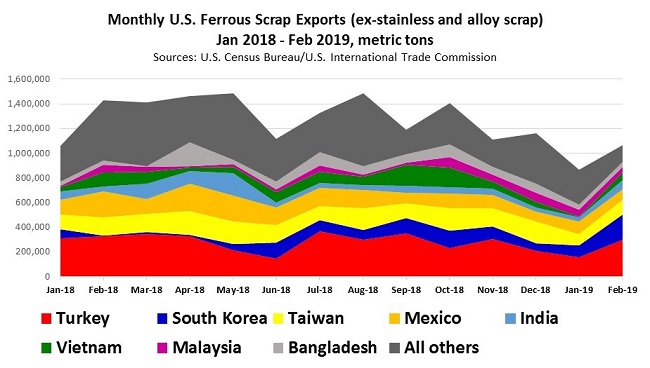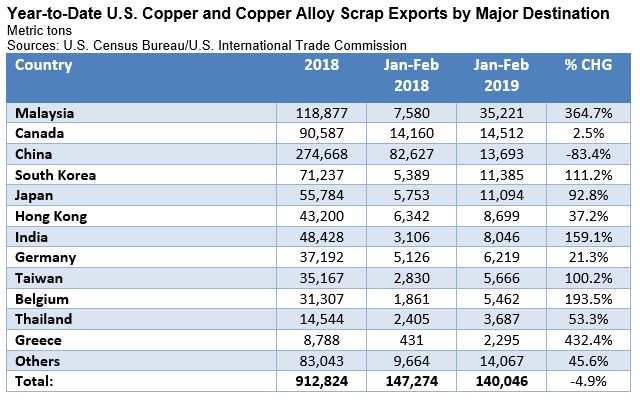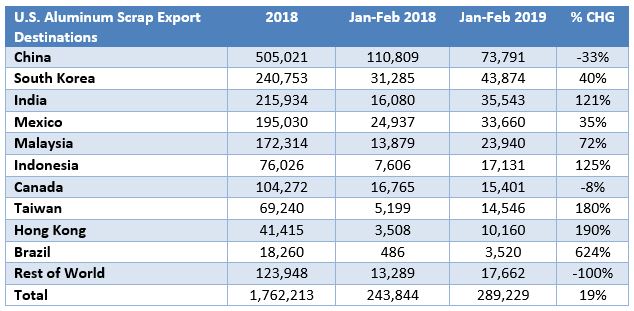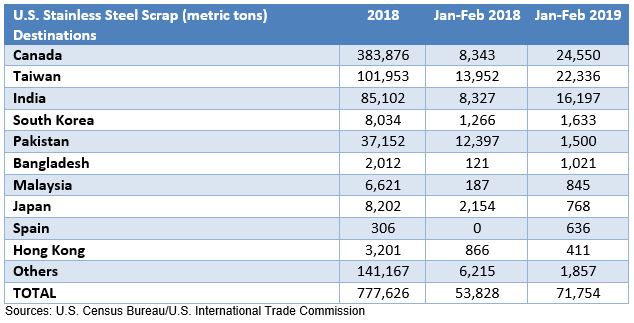Oil markets surged to a six-month high on news that sanction waivers on Iranian crude oil will be ending on May 2. The surge in oil prices created other effects in the marketplace.
The Russian ruble and Colombian peso were buoyed by the shift. Heavy crude importing countries such as India and Turkey saw their currencies decline. Iran has threatened to close the Strait of Hormuz which is responsible for carrying 20% of the world’s shipped crude oil. For scrap recyclers, this may be particularly concerning since China and Turkey were two countries that were given waivers for the U.S. sanctions on Iran. As those waivers expire, increased tensions may impact trade and the negotiations of a U.S.-China trade deal. France, Germany, and the UK established a payment channel that helped them circumvent the sanctions. This may drive China and India towards more European engagement.
Ferrous – Fastmarkets AMM reported late last week that “One US East Coast exporter carved out a deal to sell a cargo of ferrous scrap to Turkey on Friday April 26, with that transaction priced $4.50 per tonne lower than the previous US sale. The news of a deal being concluded eased fears that the sharp fall in the Turkish lira this past week may have priced US scrap out of the market…The East Coast exporter agreed to ship 22,000 tonnes of an 80:20 mix of No. 1 and No. 2 heavy melting scrap (HMS) at $308 per tonne cfr, 5,000 tonnes of shredded scrap at $313 per tonne cfr and 3,000 tonnes of bonus-grade scrap at $318 per tonne cfr.”
Trade data from the Census Bureau show that U.S. ferrous scrap exports (excluding stainless and alloy steel scrap) increased from 866,000 tons in January to 1.063 million metric tons in February thanks in part to improved Turkish demand. The major ferrous scrap export markets in February were Turkey (298,000 mt), S. Korea (206,000 mt), Taiwan (120,000 mt), Mexico (85,000 mt), India (70,000 mt), Vietnam (64,000 mt), Malaysia (46,000 mt), and Bangladesh (39,000 mt). U.S. ferrous scrap shipments to China were negligible at 2,300 tons in February.

Macquarie reported last week that “Our latest China steel survey shows sentiment has improved further this month, underpinned by a surprise jump in domestic orders (Note: after seasonal adjustment). Construction and machinery drove the uptick in sales; auto is still struggling, but there’s some evidence that even this sector has now found a bottom. Overall, demand for long products remains notably stronger than that of flats. Mills have lifted their capacity utilisation rate as margins improved and their steel inventory stayed low. With crude steel production now on the rise, appetite for raw materials is growing, pointing to more restocking of both iron ore and coking coal in the coming weeks.”
Nonferrous – Macquarie also reports that “Our latest China copper survey shows sentiment remains positive regarding the copper market out the next three months, and there is a strong growth in end-user demand for copper, as shown by the general sales improvement among smelters, traders and fabricators, led by power, construction and white goods sectors. Traders also showed increased appetite in restocking copper inventory. Smelters lifted capacity utilisation rate for the second month, and said that their concentrate inventory in usage days dipped over the past month, as they reported plans to increase concentrate purchase in the near term.”
As we reported earlier, U.S. exports of copper and copper alloy scrap edged up to 73.9 thousand tons in February (up from 66.2 thousand tons in January) according to trade figures released by the Census Bureau. Improved sales to Malaysia, Hong Kong, and mainland China accounted for most of the gains.

Here’s the more positive trend in U.S. aluminum scrap exports (in metric tons) which shows total exports are up 19% for the year-to-date as more material is moving to India, Malaysia, Indonesia, Taiwan, Hong Kong, and South Korea, more than offsetting the 33% drop in shipments to mainland China:

Last but not least, here are the official trade numbers on U.S. stainless steel scrap exports by major destination so far this, which continue to show a ramp up in export sales but, as with all trade data, may be less than perfectly accurate:

Plastics – As global awareness on ocean plastics, hard-to-recycle plastics, and landfill diversion issues have gained prominence in public policy spaces, the trade of scrap plastic recyclables continues to decline. U.S. plastic scrap exports have declined but the breakdowns by polymer may be more instructive.

Industry sources have reported that HDPE and LDPE scrap is dealing with a domestic supply crunch. This would track with a continued 31% decline in PE scrap exports. The more severe decline in Mixed Plastic scrap exports may be due to more domestic buying to capture PE scrap through secondary processing as well as import restrictions coming online from Vietnam, Thailand, and other alternative markets. The Vietnamese restriction on scrap imports also explains a severe drop in PVC exports as Vietnam was an important destination for PVC scrap.
As PET scrap imports have remained steady despite a dramatic slowdown in exports, PET processing in the U.S. appears to be seeing some investment. CarbonLITE has adjusted their plans to build a recycling plant in Central PA, a project that was announced last fall for the Lehigh Valley. Nestle Waters has a business relationship with CarbonLITE and operates bottling facilities there.
Adidas is developing what they call a “fully recyclable running shoe” that will be made of thermoplastic polyurethane. This is likely to bring up questions about acceptability into curbside programs as polyurethane isn’t accepted into any known curbside programs. This could be an interesting opportunity to promote consumer behavior that would help develop new sorts of collection programs or even a new retail end user-to-processor relationship.
For more information, please contact ReMA Research Analyst Bernie Lee.
Back to Main